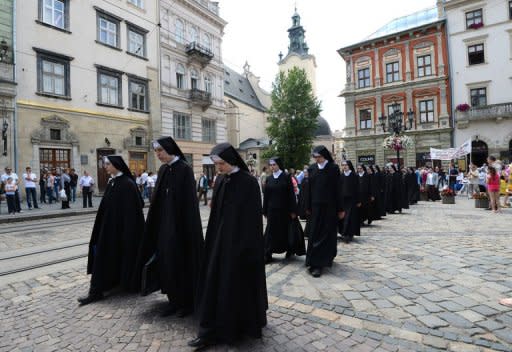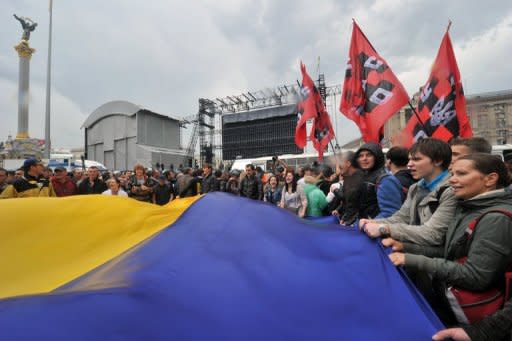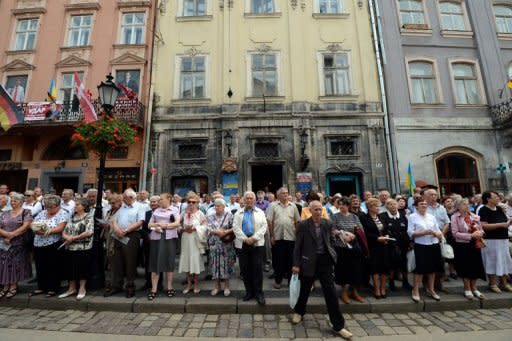Nuns and football: Euro 2012 is platform for protest
Euro 2012 has not stopped political life in Ukraine. Far from it. Instead, football is providing the perfect platform to air a range of local and national grievances in the former Soviet state. The day after Germany's 1-0 victory over Portugal in the city, it was the turn of a group of nuns and purists of the Ukrainian language to take to the streets to demonstrate. On the corner of Rynok square, where the city hall is situated, some 30 women in black habits turn up singing "Halleluja!", followed some 200 other people under the midday sun. Some hold banners denouncing the city authorities for "discrimination" for wanting to "destroy" the holy sisters' chapel. The nuns' order belongs to the Ukrainian Orthodox Greek Catholic Church (UOGCC), which has some 2,000 followers, according to one of the faithful who has turned up to hear one of its priests speak. "The sisters reconstructed the roof of their chapel but the city authorities have said that they haven't put in all the required documents," said one of their spokesmen, Viktor Pecheniuk. "We've spoken a lot with the mayor but he doesn't like us," the 22-year-old told AFP. A senior official close to mayor Andriy Sadovyy, who asked not to be named, said: "They're protesting. They're free to do so and no one wants them destroyed "They took over this building by force and its ownership is claimed by another religious order. It's just a conflict of interest." In front of the city hall, another of the faithful, Alla Posina, 37, outlines the UOGCC's demands: the fight against drugs, euthanasia and "freemasons who run everything and support gays" as well as "European laws favourable to homosexuals". The congregation made a single tour of the building's perimeter then disappeared. They were soon replaced by an even bigger crowd. Flags belonging to political parties flutter in the wind. Among them is one belonging to the opposition union, part of the Yulia Tymoshenko bloc -- named after the former prime minister who is currently in jail for abuse of power and corruption. Her supporters claim the case against her was politically motivated. A number of European leaders agree and have vowed to boycott Euro 2012 matches in Ukraine as a protest. There is also a banner in English reading "Russification: genocide of Ukraine" and showing a picture of a young woman with a traditional Ukrainian hairstyle but with her face behind barbed wire. These people are protesting against a parliamentary bill, proposed by supporters of Kremlin ally President Viktor Yanukovich, widening the rights for the official use of Russian, which is spoken in his heartland of eastern Ukraine. The opposition believes that if such a bill becomes law, it would make Russian the official second language behind Ukrainian. In a sign of the bill's sensitivity, a fight broke out between several dozen deputies in the well of parliament itself when it was presented May 24. Some of those involved in the fight ended up in hospital. In front of Lviv city hall on Sunday afternoon, speakers including Irina Farion, a lawmaker from Svobodam, urged the crowd to "protect the national language, which is the most important thing in Ukraine". "The mayor thinks that we shouldn't use language to divide but to construct the country," the senior municipal government official said. "Now, this law is dividing the country. "People in the east and the west are different for historical reasons but we have to learn to respect one another. You come across these things in other countries, like Canada, Belgium or Spain where linguistic questions are still key issues."




